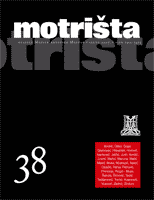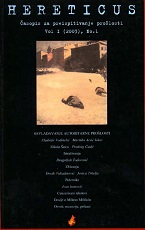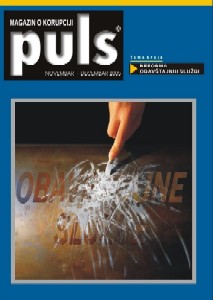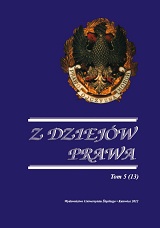
We kindly inform you that, as long as the subject affiliation of our 300.000+ articles is in progress, you might get unsufficient or no results on your third level or second level search. In this case, please broaden your search criteria.



Analysing, from the standpoint of legal overcoming of the past, both the actions of the new government undertaken in the first year after October 2000, and the things this government has not initiated or even announced, one does not get the impression that such actions and failures to act are based on a well-perceived and rounded concept of policy regarding the legal overcoming of the past, whether such policy be to forget or to remember. At any rate, no such concept has been made public, and hence the way in which the government had (if so!) set the course between the „Scylla of memory and Charybdis of oblivion" is a not a public matter. Members of the present government have failed to announce an overall legal overcoming of the past in the above-mentioned published programme from the opposition phase before October 2000. What happened then - a combination of armed peoples' revolution and some elements of coupe d'etat (arrangements with important members of police and armed forces), its second part in particular, contributes to certain inconsistencies and the porous nature of the subsequent policy towards the past.
More...


Countries without developed democractic institutions have favorable climate for “flourishing” organised crime and corruption. Lack of anticorruption institutions and mechanisms contributed to spreading of corruption in Serbia.
More...
Democratic supervision of intelligence sector institutions is a delicate task as the need to limit access is real.
More...
During the last twenty years, the most important issue as far as fighting organised crime strategy has been the disabling of criminals in using and legalizing their profit acquired by criminal acts.
More...
The European Public Procurement Network is the international network for cooperation gathering the public procurement officials from European Union member countries, countries that are entering the membership and officials from Norway, Iceland, Liechtenstein and Switzerland.
More...
The importance of the Balkans in international illegal drug trafficking is due to geographic position of the peninsula and direct links to the functioning of western european market. One of the most important euroasiatic traffic courses and the shortest land connection between Asia Minor, Middle East and European Union is spreading over the Balkans. In international drug traffic chain, the counties on the Balkans are the countries of origin, transit and destination of drug industry.
More...
The government of Republic of Serbia drafted the National Strategy for Fighting the Corruption, in May 2005. The Strategy is based on international standardas for fighting the corruption model: prevention, repression, and education. The main aims are establishing the rule of law, normative and institutional changes, runnig down the corruption phenomenon, establishing the responsibility for illegal actions, promotion of ethics standards.
More...
National accomplishment realized in the aftermath of the Second World War is often described as a "germain economic miracle", due to the fact that having a demolished infrastructure, Germany had became the strongest european economic force, in the relativly short period of time.
More...
Relation between corruption and economic development of the transitional neighbouring countries, may be perceived on the results of managing the sources of international multilateral and bilateral aid.
More...

State borderlines of Czechoslovak Republic was determined by the Peace treaties after World War I. and partly also after World War II. Confirmation of existing borderlines was established by agreements with neighbouring states, particularly Agreement of Slovakia and Ukraine about common borderlines of October 14. 1993, Agreement of Slovak Republic and Hungarian Republic about régime and cooperation on the state borderline of June 28. 1995, Agreement between Slovak Republic and Polish Republic about common borderline of Jule 6. 1995 and Agreement between Slovak Republic and Czech Republic about common borderline of January 4. 1996.
More...

Lithuanians can boast about a significant contribution to the development of the military criminal code of the Republic of Poland I. The ius specjale in question, it being definitely the military law, represents some common regularities governing the common law of the Republic of Both Nations. What needs to be emphasized is Lithuanians’ constant attempts at maintaining their own legal system, the example of which are not only Lithuanian Statute or extortion the nomination of a separate deputation preparing law codification, but also a constant attempt at maintaining independence also in a military law from the Great Sejm. The representatives of the Radziwiłł family did a lot in this respect, Krzysztof and Janusz among others, thanks to whom Lithuania possessed military laws different from the crown ones, even after publishing Artykuły hetmańskie by the Sejm in 1609, and ascribing a value of the act perpetually biding to them. Lithuanians did not only continue to issue their own military acts, but also made an attempt to create a separate military codification known as Artykuły późniejsze wojskowe different from the Crown one, which clearly proves the willingness to maintain independence also in this respect. The comparative research in question showed mutual influences of military laws biding in the Crown and Lithuania. What is worth emphasizing is the fact that the so called Artykuły słuckie by Hieronim Radziwiłł are one of the steps taken in maintaining independence and continuity of a military law in Grand Duchy of Lithuania.
More...

Political revival in Poland in 1956 characterised by among others a progressive freedom of speech, brought about criticism of the Stalinist period, including criticism of the judiciary. At that time, the first attempt to call Stalinist prosecutors accused of breaking law and order to account. In so doing, even the special committees were established. Their conclusions were only partially realized. None of the prosecutors indicated in the committee reports was brought to court between 1956 and 1958. The only “inconveniences” some of them experienced included relegation to a different prosecutor’s position, exemption from the prosecutor’s office or lowering the military rank in the case of military prosecutors.
More...
Great Moravia was first state formation that with its area had reached also the area of present Slovakia. It had been formed by merging of independent Moravian and Nitrian principalities in the 9th century. Its inhabitants were ascendants of Slovaks and Czechs. Character of the Great Moravian State we can mark as relatively centralized formation, where ruler and his family has dominated status. Despite the time of its creation this formation showed all most important signs of state. It has relatively well developed system of state bodies, system of local bodies as example of structured state area into smaller local units. Existing legal system in this area had ultimate signs of customary law, in the same time usage of written legal documents existed. During its existence Great Moravia had also independent church organization and it performed independent foreign policy. During its existence this state has been recognized as independent unit also from Pope. The most critical fact that contributed to downfall of Great Moravia in 10th century were on one side conquests of Hungarian tribes as well as conflicts in the rulers family. The existence of Great Moravia is in Slovakia for centuries accepted as important milestone of Slovakian nation in its attempts for achieving Slovakian state independency.
More...